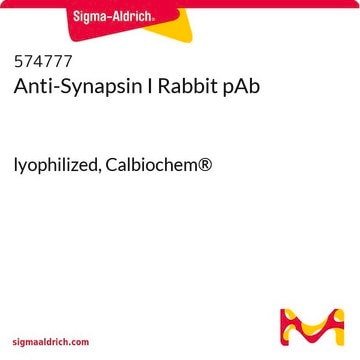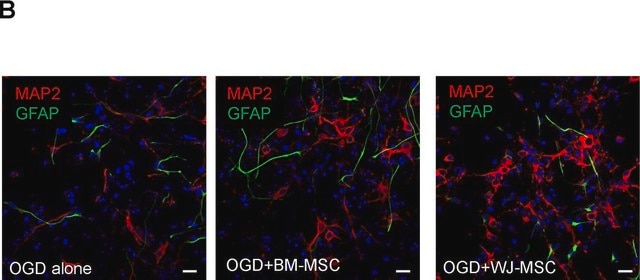AB1543
Anti-Synapsin I Antibody
serum, Chemicon®
Synonym(s):
Synapsin-1
About This Item
Recommended Products
biological source
rabbit
Quality Level
antibody form
serum
antibody product type
primary antibodies
clone
polyclonal
species reactivity
human, bovine, rat, mouse
manufacturer/tradename
Chemicon®
technique(s)
immunocytochemistry: suitable
immunohistochemistry: suitable (paraffin)
immunoprecipitation (IP): suitable
western blot: suitable
NCBI accession no.
UniProt accession no.
shipped in
dry ice
target post-translational modification
unmodified
Gene Information
human ... SYN1(6853)
General description
Specificity
Immunogen
Application
Neuroscience
Synapse & Synaptic Biology
1:200 of a previous lot was used for labeled Protein A, 1:1,000 dilution for ECL.
Immunocytochemistry:
1:500-1:2,000 dilution of a previous lot was used.
Immunoprecipitation:
5 μL of a previous lot quantitatively immunoprecipitated all synapsin in 200 μg of rat brain.
Optimal working dilutions must be determined by the end user.
Quality
IHC-Paraffin Staining With Epitope Retrieval: Rat Hippocampus
Target description
Physical form
Storage and Stability
Handling Recommendations: Upon receipt and prior to removing the cap, centrifuge the vial and gently mix the solution. Aliquot into microcentrifuge tubes and store at -20°C. Avoid repeated freeze/thaw cycles, which may damage IgG and affect product performance.
Analysis Note
Mouse hippocampal primary neurons, Mouse brain lysates, PC-12 cells.
Other Notes
Legal Information
Disclaimer
Not finding the right product?
Try our Product Selector Tool.
recommended
Storage Class Code
10 - Combustible liquids
WGK
WGK 1
Flash Point(F)
Not applicable
Flash Point(C)
Not applicable
Certificates of Analysis (COA)
Search for Certificates of Analysis (COA) by entering the products Lot/Batch Number. Lot and Batch Numbers can be found on a product’s label following the words ‘Lot’ or ‘Batch’.
Already Own This Product?
Find documentation for the products that you have recently purchased in the Document Library.
Our team of scientists has experience in all areas of research including Life Science, Material Science, Chemical Synthesis, Chromatography, Analytical and many others.
Contact Technical Service








